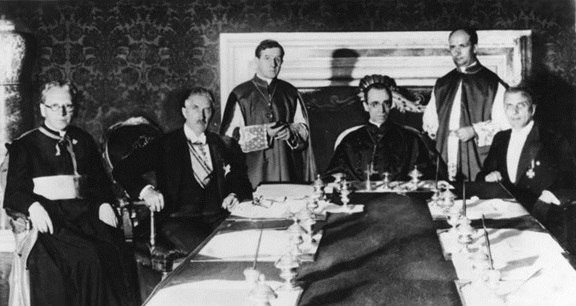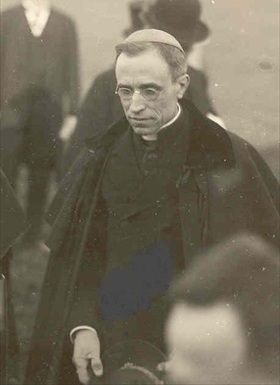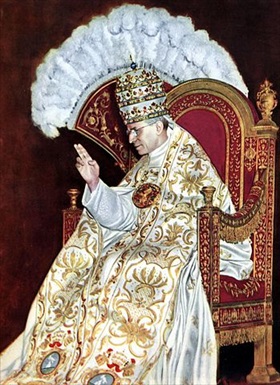PIUS XII IS NEW VATICAN HEAD
Rome, Italy • March 2, 1939
On this date in 1939 in Vatican City, Roman Catholic Cardinal Eugenio Pacelli was elected pope on his sixty-third birthday. His coronation took place ten days later. Son of a Vatican lawyer, Pacelli took the name Pius XII. Pius’ actions during the Holocaust are controversial. Critics have accused him of everything from anti-Semitism, to cozying up to or outright colluding with Fascists and Nazis, and to his failure to publicly condemn the Nazis for the murder of Europe’s Jews.
A letter in the Vatican archives written by a German Jesuit priest in December 1942 recently came to light. The letter, care of the pope’s secretary and closest adviser, informed the pope of the mass murder of thousands of “Poles and Jews” at Belzec, a Nazi death camp in Poland. Said letter was found among the pope’s personal papers, meaning Pius certainly knew of the Belzec murders. The pope’s failure to issue a protest even using a back channel was all the more galling as thousands of Italy’s own Jews were on the threshold of being rounded up and deported to concentration camps, where nearly all of them perished. Pius’s defenders, on the other hand, would argue that his mostly silent diplomacy, such as it was, saved hundreds of thousands of innocent victims and Jews from Nazi terror and Nazi genocide in Italy and the rest of Europe as he labored behind the scenes. To wit, in September 2023 researchers uncovered documentation listing 3,200 Jews who had been sheltered from the Nazis in Catholic convents and monasteries following the Nazi takeover of Rome in 1943.
Before being elected to the Papacy six months before the outbreak of World War II in Europe, Cardinal Pacelli had lived twelve years in Bavaria, the birthplace of Adolf Hitler’s National Socialist German Workers’ (Nazi) Party, serving as Apostolic Nuncio for all Germany. He was well aware of the Nazis’ anti-Semitic practices and their extraordinary penchant for brutalizing their enemies. Reacting to widespread criticism of the Vatican’s concordat with Hitler’s government in July 1933—an agreement that he, as then-Vatican State Secretary, had been instrumental in drafting—the future pope privately told the British ambassador in Rome that the Catholic Church deplored the actions of the German government at home, their persecution of Jews, their proceeding against political opponents, and the reign of terror to which they subjected Germany and Austria. Between 1933 and 1939 Pacelli issued fifty-five protests of violations of the 1933 Reichskonkordat. Put simply, tensions between the Holy See and the Nazis have a long history.
In his first encyclical letter as pontiff, issued a month and a half after the German invasion of Poland, Pius XII called for the restoration of that country’s independence, denounced racism, and called for love, compassion, and charity to prevail over war. For much of the war, Pius maintained a public front of neutrality, indifference, or silence while German atrocities were committed outside Italy. Privately and occasionally publicly the pope interceded to help Jews; for example, in July 1944 he pushed the Hungarian regent, Adm. Miklós Horthy, to cease his government’s deportation of Jews to Nazi death camps. When the German SS (or Schutzstaffel, the elite military unit and special police force of the Nazi Party) began ferreting out Jews from inside Italy in 1943 in places where the Wehrmacht (regular German armed forces) held sway, such as in Benito Mussolini’s so-called Republic of Salò in Northern Italy, Pius XII directed the Catholic Church to make substantial efforts to save Italian Jews (see above). In the end, four-fifths of the Jewish population of Italy escaped slaughter. Maybe or maybe not, that statistic is testament to the pontiff’s better-late-than-never moral courage.
Eugenio Marìa Giuseppe Giovanni Pacelli (Pope Pius XII), 1876–1958
 |
Above: Vatican Secretary of State Cardinal Eugenio Pacelli (seated, center) at the signing in Rome of the July 20, 1933, treaty that outlined the respective roles of the Catholic Church and state in the German Reich—the Reichskonkordat. (The word “concordat” describes the Vatican’s agreements with secular governments.) Seated to Pacelli’s right is Hitler’s vice-chancellor, Franz von Papen. Between 1933 and 1939 Pacelli issued dozens of protest violations of the Reichskonkordat, which he had hoped would protect the rights of Catholic lay people, Catholic clergy, and Church property during Hitler’s administration. Pacelli’s actions as secretary of state and later as Pius XII have generated controversy, particularly on the subject of the Holocaust. An entire library of books has been built either defending his papacy or taking him to task. His detractors have accused him of everything from anti-Semitism to colluding with the Nazis (“Hitler’s pope”). Others claim the Catholic Church did more than any other religious body to save Jewish lives, occasionally through the pope’s personal intervention; e.g., when Pius XII instructed papal diplomats to aid persecuted Jews in occupied nations, contributed money to aid desperate Jews, opened Catholic facilities in the Vatican and in other parts of Rome and Italy to shelter thousands of Jews from the Nazis (e.g., in convents), and gave direct face-to-face orders to protect Jews from the Nazis. In 2009 Benedict XVI (German-born pontiff from 2005 to 2013) approved a decree recognizing Pius’s “heroic virtues,” a first step toward sainthood, a step that angered many Jews. The decades-long controversy over his wartime papacy is thought to have halted his elevation to sainthood notwithstanding his “heroic virtues.” Benedict’s successor, Pope Francis, announced in early 2019 that the Vatican’s Secret Archive on Pius XII would be opened in March 2020 after years of pressure from historians and Jewish campaigners like Yad Vashem, Israel’s Holocaust memorial and museum. “The church isn’t afraid of history,” Francis told staff at the Vatican archives. Yad Vashem welcomed Pope Francis’ decision to allow visitors to access sealed documents about Pius XII, saying that it will “enable objective and open research as well as comprehensive discourse on issues relating to the conduct of the Vatican in particular, and the Catholic church in general, during the Holocaust.”
 |  |
Left: Pacelli, Apostolic Nuncio (ambassador) to Bavaria (1917–1925), is seen paying a visit to a group of bishops in 1922. Pacelli was simultaneously Apostolic Nuncio to Germany (1920–1930).
![]()
Right: Pope Pius XII on his day of coronation, March 12, 1939. Pacelli (1876–1958) took the same papal name as his predecessor, a title used exclusively by Italian popes. When Pacelli was elected pope, the Nazi regime registered strong protests and called Pius XII the “Jewish Pope” because of his earlier condemnation of German race laws.
Coronation of Pope Pius XII (in Italian), March 12, 1939
![]()

 History buffs, there is good news! The Daily Chronicles of World War II is now available as an ebook for $4.99 on Amazon.com. Containing a year’s worth of dated entries from this website, the ebook brings the story of this tumultuous era to life in a compelling, authoritative, and succinct manner. Featuring inventive navigation aids, the ebook enables readers to instantly move forward or backward by month and date to different dated entries. Simple and elegant! Click
History buffs, there is good news! The Daily Chronicles of World War II is now available as an ebook for $4.99 on Amazon.com. Containing a year’s worth of dated entries from this website, the ebook brings the story of this tumultuous era to life in a compelling, authoritative, and succinct manner. Featuring inventive navigation aids, the ebook enables readers to instantly move forward or backward by month and date to different dated entries. Simple and elegant! Click 











